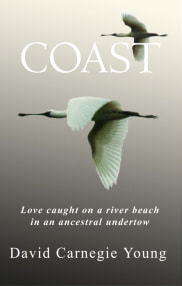COAST is a unique novel that sets up a resonance between a departing shore in Scotland, and a receding shore, in New Zealand. The story begins with a Scots ploughman from the Mearns, who is confronted with a new and sometimes volatile environment in coastal Rangitikei-Whanganui, New Zealand. The promise and opportunities within a Scots community in his new home are ultimately robbed from him by the war on the Western Front. However, the relationship he has established with this memorable coastal landscape connects fathers and sons through three generations.
Visiting Scotland to research this novel – a novel based on a Scottish grandfather he never knew - David arrived at St Cyrus in the North East Mearns. Here he found a coastline with resonances of the shifting estuary, dune country and rich birdlife from the coastal landscape of his childhood at Turakina, New Zealand, 18,000 kilometres away. The story spins from there, exploring how a coastal environment might heal the after effects of trauma experienced by those who fought in war.
Told by three inter-cutting voices, the narrative raises questions about war and its impacts on fathers and sons long after the fighting has finished, of the tension between community and freedom, of family and belonging, the relationship of tangata whenua to the landscape and the redemptive power of love.
Ultimately, the novel is a love story, less of the classical man-woman theme than that of a son for his father, and for the magic of wild country. David Young connects his lifelong fascination with water, memory and landscape.
Visiting Scotland to research this novel – a novel based on a Scottish grandfather he never knew - David arrived at St Cyrus in the North East Mearns. Here he found a coastline with resonances of the shifting estuary, dune country and rich birdlife from the coastal landscape of his childhood at Turakina, New Zealand, 18,000 kilometres away. The story spins from there, exploring how a coastal environment might heal the after effects of trauma experienced by those who fought in war.
Told by three inter-cutting voices, the narrative raises questions about war and its impacts on fathers and sons long after the fighting has finished, of the tension between community and freedom, of family and belonging, the relationship of tangata whenua to the landscape and the redemptive power of love.
Ultimately, the novel is a love story, less of the classical man-woman theme than that of a son for his father, and for the magic of wild country. David Young connects his lifelong fascination with water, memory and landscape.
